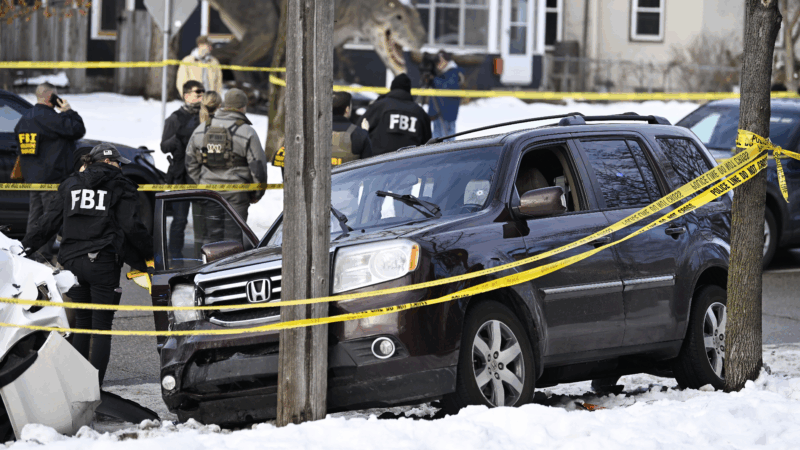Firing federal employees was swift. Unwinding the terminations is proving complicated
Federal agencies continue to unwind the firings of federal employees to comply with court orders, in a labor-intensive process affecting more than 24,000 people nationwide.
Last Thursday, U.S. District Judge William Alsup called for six agencies to immediately reinstate probationary employees they had fired. The case was filed in federal court in San Francisco by civic organizations who said they’d been harmed by the government’s inability to provide services.
Later that evening, U.S. District Judge James Bredar ordered 18 agencies to temporarily reinstate their fired probationary employees in a case brought in federal court in Baltimore by a group of Democratic attorneys general. Nineteen states and the District of Columbia argued their harm stemmed from not having received 60-days’ notice of the mass layoffs as required by federal law, which left them unable to provide a rapid response that could have mitigated the economic impact.
Probationary employees are typically those in their first or second year on the job but can include people promoted into new positions.
The Trump administration appealed both decisions after issuing a blistering critique of the rulings.
“Singular district court judges cannot abuse the power of the entire judiciary to thwart the President’s agenda,” White House press secretary Karoline Leavitt said last week. “If a federal district court judge would like executive powers, they can try and run for President themselves.”
On Monday, in compliance with Bredar’s order, the 18 agencies filed status reports on their reinstatement efforts, which included contacting fired employees through their personal email addresses and phone numbers, and at one agency, through certified mail. Collectively, the agencies reported they had fired more than 24,000 probationary employees since Jan. 20.
All 18 agencies reported that they had canceled terminations for the vast majority of those fired. A majority of the agencies stated they had placed reinstated employees on paid administrative leave, with no other information on when or even whether they would resume work.
Notable exceptions include:
- The Department of Energy, which said more than 500 reinstated employees would return to active duty once their IT access and badges were restored.
- The Department of Labor, which said the 167 probationary employees who’d received termination notices were either already back to work or had voluntarily separated.
- The Department of Transportation, which said some 775 reinstated employees would return to active duty on Thursday if they don’t resign.
- The Department of Agriculture, which said it had a phased plan for returning probationary employees to active duty, though it did not lay out a timeline, and USDA employees contacted by NPR had not been told when or if they’d return to work. USDA said of the 5,714 probationary employees it fired, 1,070 were seasonal Forest Service employees who were returned to their prior unpaid status.
It’s unclear whether the remaining agencies plan to keep reinstated employees on paid administrative leave while the government’s appeals are pending. In statements submitted to the court, agency human resource leaders wrote of the “significant administrative burdens” of onboarding reinstated employees, issuing new security badges and equipment, re-enrolling employees in benefit programs and other tasks.
They also warned of “significant confusion” that would ensue should an appeals court overturn the judges’ rulings, making it harder for managers to assign work.
Those arguments, also presented in the San Francisco case, appeared to bring the defendants little sympathy from the judges overseeing the cases.
While Bredar’s temporary restraining order defines reinstatement as either bringing employees back to work or putting them on leave, Alsup on Monday drew a sharp distinction between the two, noting that paid administrative leave was not okay for the six agencies his order covers – the Departments of Agriculture, Defense, Energy, Interior, Treasury and Veterans Affairs.
“This is not allowed by the preliminary injunction, for it would not restore the services the preliminary injunction intends to restore,” he wrote.
Alsup ordered those agencies to report back by noon on March 18 whether it had, in fact, placed reinstated employees on administrative leave.
In response, the government denied it was trying to skirt Alsup’s order and said reinstating people into paid leave status was “an administrative, intermediate measure,” merely the first of a series of steps to full reinstatement. The government did not lay out what the next steps would be.
Alsup had earlier ordered agencies to provide by March 20 a list of all probationary employees fired, along with an explanation of what had been done to comply with the preliminary injunction.
Meanwhile, Bredar will consider broader relief in the states’ case at a preliminary injunction hearing scheduled for March 26.
Have information you want to share about ongoing changes across the federal government? NPR’s Andrea Hsu can be contacted through encrypted communications on Signal at andreahsu.08.
White House says ‘all options’ are on the table for Greenland, including diplomacy
President Trump has long expressed an interest in acquiring Greenland. White House press secretary Karoline Leavitt says Trump isn't ruling out any options, but that diplomacy is his "first option."
ICE agent fatally shoots woman in Minneapolis amid immigration crackdown
The Department of Homeland Security accused the victim of being a "rioter" and that the ICE officer who pulled the trigger was "fearing for his life." Mayor Jacob Frey rejected claims of self-defense.
U.S. population growth is slowing. The immigration crackdown is a major factor
Congressional forecasters have lowered their projection for U.S. population growth over the next decade by 7 million people as a result of the Trump administration's immigration crackdown as well as falling birth rates.
Nick Reiner’s attorney removes himself from case
Defense attorney Alan Jackson said that circumstances beyond his and Reiner's control made it "impossible" to continue representation.
Béla Fleck cancels Kennedy Center appearance, says it’s become ‘charged and political’
The 18-time Grammy Award winner is the latest musician to cancel an show at the Kennedy Center. Béla Fleck says he cannot currently perform there because it "has become charged and political."
How large is Greenland, really? Your map may be deceiving you
Talk of annexation has Greenland in the news again. But due to quirks of cartography, some common maps show the territory much larger than it is.






